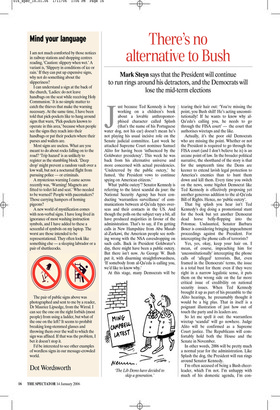Mind your language
I am not much comforted by those notices in railway stations and shopping centres reading, ‘Caution: slippery when wet.’ A variant is, ‘Slippery in conditions of ice or rain.’ If they can put up expensive signs, why not do something about the slipperiness?
I can understand a sign at the back of the church, ‘Ladies: do not leave handbags on the seat while receiving Holy Communion.’ It is no simple matter to catch the thieves that make the warning necessary. At the same time, I have been told that pick-pockets like to hang around signs that warn, ‘Pick-pockets known to operate in this area,’ because when people see the signs they reach into their handbags or pat their pockets where their purses and wallets are.
Most signs are useless. What are you meant to do about rocks falling on to the road? ‘Trip hazard’ is as unlikely to register as the stumbling block. ‘Deep drop’ might prevent a random vault over a low wall, but not a nocturnal flight from pursuing police — or criminals.
A mysterious warning I came across recently was, ‘Warning! Magnets are fitted to toilet lid and seat.’ Who needed to be warned? People with pacemakers? Those carrying hampers of homing pigeons?
A new world of mystification comes with non-verbal signs. I have long lived in ignorance of most washing instruction symbols, and I have added to these a screenful of symbols on my laptop. The worst are those intended to be representational. They often look like something else — a sleeping labrador or a pair of shuttlecocks.
The pair of public signs above was photographed and sent to me by a reader, Dr Maurice Lipsedge, from the Wirral. I can see the one on the right forbids (most people) from using a ladder, but what of the one on the left? It seems to prohibit breaking long-stemmed glasses and throwing them over the wall to which the sign was affixed. If that was the problem, I bet it doesn’t stop it.
I’d be interested to see other examples of wordless signs in our message-crowded world.














































 Previous page
Previous page